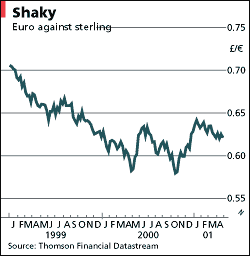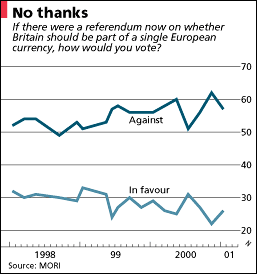|
|
||||||
 | |
ON PAPER, at least, the positions of Labour and the Conservatives towards Britain’s membership of the single European currency, the euro, seem rather similar. Both have adopted a variation of the policy of “wait and see”, a slogan first coined by John Major, the Tory prime minister who preceded Tony Blair. Both parties have also promised that any proposal to join the euro would have to be confirmed in a referendum.
The Tories say that, if elected, they would keep Britain out of the euro for at least the lifetime of the next parliament, a maximum of five years—but have not ruled out membership in principle. The Labour Party says that, in principle, it would like Britain to join the euro, but says that “the economic conditions must be right”. Mr Blair said in February that, if re-elected, Labour would pronounce within two years on whether the economic tests had been met. It is widely assumed that a referendum would follow soon after a favourable assessment.
 | |
But although the formal positions of the two main parties are fairly close—appearing to boil down to a gap of three years—there is a real gulf in underlying attitudes. Mr Blair, for all his public caution, is clearly keen for Britain to join the euro. He has said repeatedly that he wants Britain to be “at the heart of Europe”. He has attempted to maintain national influence within the European Union by playing a leading role in initiatives such as the efforts to form an EU defence arm. But his senior advisers have repeatedly warned him that, in the long term, Britain will lose influence within the EU if it stays out of the single European currency. Mr Blair is also concerned that Britain will lose foreign investment, and has clearly been under pressure from leading multinationals, such as Nissan and Toyota, to give them assurances that Britain will join the euro fairly soon.
By contrast, the Conservatives in their current mood are highly unlikely ever to recommend that Britain join the single currency. William Hague’s refusal to rule out the euro completely simply reflects a desire not to close off options, as well as a desire not to provoke an open rift with the Tories’ small remaining band of pro-Europeans.
The reason that the parties’ underlying attitudes are so different is that they divide profoundly on the political consequences of euro-membership. Mr Blair says that he regards the question as, above all, one of economics. He has said that the government will base its recommendation on whether to join the euro on five economic tests, first set out in October 1997. These are:
•the achievement of sustainable convergence between the economic cycles of Britain and the euro block;
•the effect of joining the euro on employment;
•the effect on foreign investment into Britain;
•the effect on the City of London;
•and whether the economy is “flexible” enough to cope with economic shocks, once Britain has lost the power to adjust the exchange rate or interest rates.
New Labour acknowledges that there are political and constitutional issues raised by joining the single currency, but says that they are not important enough to override the economic issues.
The Conservatives disagree. They believe that joining the euro would be a giant step along the path towards the dreaded “European super-state”. A single currency necessarily involves giving up national control of monetary policy and interest rates. It is true that in Britain interest rates are now set independently by the Bank of England, not by politicians: a policy introduced by Labour in 1997, and subsequently endorsed by the Tories. But the Conservatives point out that the Bank of England works to an inflation target set by the British government, and that its monetary policy is tailored specifically to British conditions. If Britain were to join the euro, both these things would change.
 | |
The Tories also believe that the political consequences of euro-membership would fairly quickly be seen to extend beyond monetary policy. They point out that, in the modern world, only states have issued currencies; the EU’s creation of its own currency, say the Tories, is therefore a highly symbolic move towards European statehood. In practical terms they anticipate that, if Britain joined the euro, a pan-European economic policy would threaten to move into sensitive areas which have been at the heart of modern British political debate—specifically tax and fiscal policy. The European Commission already has the power to censure and, in extreme cases, fine members of the euro zone over their internal economic policies, and in February the Tory press was delighted to link a fierce commission reprimand of Ireland (within the zone) with some unfavourable commission comments on Gordon Brown’s policies in Britain (outside it).
The Tories believe there will be mounting pressure for tax harmonisation, based on the argument that consistent economic policies are needed throughout the euro-zone. Labour, by contrast, argues that the spectre of “taxes set in Brussels” is a scare-tactic, and point out that Britain has the right to veto any effort to pursue tax harmonisation. Labour will seek to portray Tory opposition to euro-membership as a form of “little England” xenophobia. This argument is made even more strongly by the Liberal Democrats, who in turn attack Labour for being too timid in making the case for the euro and taking on the alleged xenophobes in the Tory Party.
The parties are also divided about the potential economic impact of joining. The Liberal Democrats will argue that Britain is already suffering economically from staying out of the single currency zone; they will point to warnings by Japanese investors and car manufacturers that currency volatility and the high level of the pound have made it less profitable to invest in Britain. Labour will say that it is too soon to gauge the economic impact of staying out of the euro. Indeed, the party may try to go through the entire election campaign without giving a view on how close Britain is to meeting its vaunted five tests—which are fairly vague, in any case.
The Conservatives will also point out that in 1999-2000, the United Kingdom was once again the leading recipient of foreign direct investment within the European Union. They will argue that Britain is flourishing outside the euro zone, and will use the episode of Britain’s humiliating ejection from the European exchange-rate mechanism in 1992 (under the previous Tory government) to highlight the dangers of fixed exchange-rate regimes and “one-size-fits-all” interest rates.
Just as significant as the parties’ divergent views on euro-membership is the question of how large the issue will loom during the election. Opinion polls show that this is one issue on which the Tories are clearly more in tune with public opinion than Labour. For the past year, polls have shown that well over 50% of the British public reject the single currency.
As a result, Labour strategists will fight tooth and nail to keep the euro off the agenda during the election. They will argue that since the government is committed to holding a referendum, the whole issue can be safely deferred. The Liberal Democrats will probably also want to play down the euro, since they face a number of close contests against the Tories in the Eurosceptic south-west of England. The Tories, by contrast, will try to make the euro central to the election by arguing that Labour intends to “bounce” Britain into the single currency. They are arguing that the election will be Britain’s “last chance to save the pound”, and claim that any referendum under New Labour will be rigged in favour of the government.
William Hague’s chances of pulling off an unlikely victory would be significantly advanced if he can turn this into a “euro election”. But even that may not be enough. Although polls show that most of the electorate are against joining the euro, the question usually comes well down the league table when voters are asked to rank issues in order of importance. Bread-and-butter issues like health, education and the economy are more likely to swing this election.
|
Copyright © 2002 The Economist Newspaper and The Economist Group. All rights reserved. |